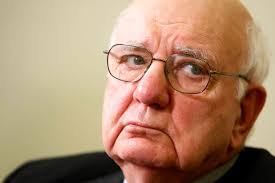
The hesitant FED and the Volcker Mistake Update Aug 11 2023

Paul Volcker
Head of the Fed 1980's
The Fed’s Hesitation
With the market’s recent rally, and inflation backing off, some investors may be thinking the worst of the current financial crisis is over.
Potential buyers of stocks might argue we have seen the inflation highs of the period, and that prices will soon return to normal, that the Federal Reserve (Feds) will back off their interest rate increase crusade and that the swallows will once again return to San Juan Capistrano in masse.
Pun intended of course on that last one.
Readers of this column will know that, in my opinion, inflation will not subside, may even go higher and that the Feds will be forced to keep interest rates higher for longer to address it. Higher interest rates are the perceived medicine to squash inflation.
In the Fed’s July 26th, 2023 meeting press release they stated: “The Committee will continue to assess additional information and its implications for monetary policy”.
In a nutshell, the Feds have indicated they have no set path and will adopt a wait and see policy as it pertains to inflation and the interest rate increases to address it.
Many investors might not be old enough to know the historical events that may be guiding Fed Chief Jerome Powell’s decision to keep interest rates elevated and continue to maintain a restrictive monetary environment.
The historical event I am eluding to is known as “Volcker’s Mistake”, and refers to Fed Chief Paul Volcker during the late 1970’s.
Volcker took over the Federal Reserve Bank as head honcho in 1979, and immediately set about the task of ending the worst inflation the U.S. had seen since the end of World War II.
Volcker raised interest rates quickly and by a lot.
As expected, the economy was subsequently hit by recession in January of 1980 which fostered massive employee layoffs and a spiraling economy.
Under intense pressure to take his foot off the brakes and provide relief to the suffering economy, Volcker quickly cut rates by seven percentage points. Although massive by today’s standards, but not so back then, a seven percent reduction in the interest rate was still considered a drastic move.
The recession did begin to subside by July of that same year but inflation stayed stubbornly high. In fact, it accelerated even faster.
As a result, the Feds credibility as inflation fighters was severely damaged. Volcker then backpedaled and had to raises rates once again which fostered a repeat of the earlier recession that was worse than the first one and lasted until 1983.
Had Volcker ignored the 1980 recession and stood his ground on interest rates, he might have avoided the inflation that roared back and the more severe recession that followed. A monetary blunder by any measure.
Fast forward to today and Fed Chief Powell is well aware of the mess Volcker made of things by acting too quickly and dropping rates too soon which spawned additional inflation and a reoccurring recession that amplified an already bad situation.
Powell does not want to make the same mistake Volcker did. He does not want to go down in the history books for the same thing nor put the economy through anything worse than what is already upon us.
For this reason, Jim Rickards of the Daily Reckoning in his July 31st, 2023 musing concluded: “The Fed is not done and more rate hikes are coming”.
Rickards ought to know. He is an investment banker with over 30 years’ experience working in capital markets, advises the Department of Defense on global finance, serves as a facilitator studying financial war games for the Pentagon and was the principal negotiator in the 1998 bailout of LTCM by the Federal Reserve Bank of New York.
I hold the opinion Rickards knows of what he speaks and agree with his conclusions that we may be far from being out of the woods as it pertains to inflation and future interest rate increases by the Fed.
“Watching the markets so you don’t have to”
This article expresses the opinion of Marc Cuniberti and is not meant as investment advice, or a recommendation to buy or sell any securities, nor represents the opinion of any bank, investment firm or RIA, nor this media outlet, its staff, members or underwriters. Mr. Cuniberti holds a B.A. in Economics with honors, 1979, and California Insurance License #0L34249. His insurance agency is BAP INC. that can be contacted at (530)559-1214. Email: news@moneymanagementradio.com
Interested in Lifetime Income possibilities that wont outgrow your money?
(530) 559-1214
Marc Cuniberti
--







